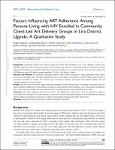| dc.contributor.author | Rogers, Isabirye | |
| dc.contributor.author | Didan, Jacob Opii | |
| dc.contributor.author | Sharon, Opio Ekit | |
| dc.contributor.author | Alice, Kawomera | |
| dc.contributor.author | Luke, Lokiru | |
| dc.contributor.author | Robert, Isoke | |
| dc.contributor.author | Joachim, Ssenkaali | |
| dc.contributor.author | Sean Steven, Puleh | |
| dc.date.accessioned | 2023-06-15T05:59:17Z | |
| dc.date.available | 2023-06-15T05:59:17Z | |
| dc.date.issued | 2023 | |
| dc.identifier.citation | Isabirye, R., Opii, D. J., Opio Ekit, S., Kawomera, A., Lokiru, L., Isoke, R., Ssenkaali, J., & Puleh, S. S. (2023). Factors Influencing ART Adherence Among Persons Living with HIV Enrolled in Community Client-Led Art Delivery Groups in Lira District, Uganda: A Qualitative Study. HIV/AIDS - Research and Palliative Care, Volume 15, 339–347. | en_US |
| dc.identifier.uri | https://doi.org/10.2147/HIV.S414971 | |
| dc.identifier.uri | http://ir.lirauni.ac.ug/xmlui/handle/123456789/709 | |
| dc.description.abstract | Background: Community client-led ART delivery groups (CCLADs) were introduced as one of the strategies to better serve
individual needs and reduce unnecessary burdens on the health system. However, limited data adequately explained the factors
influencing ART adherence among HIV/AIDS patients in CCLAD’s model of care. The study aimed to assess the factors influencing
ART adherence among HIV-positive patients attending CCLADs in Lira District, Uganda.
Materials and Methods: We employed a qualitative method of data collection recruiting 25 study participants (expert clients)
between July and August 2020. The study purposefully chose 25 participants to participate in with HIV/AIDS patients enrolled in
community-based HIV care models. The interviews were recorded on audiotape, transcribed, and translated verbatim. We used
a thematic approach to analyze the data.
Results: Our study shows that social support among group members, patient self-motivation, counselling, and guidance were the
major facilitators of adherence. From the analysis of results, our study found the following themes: Lack of food, stigma, forgetfulness,
stress, unfair staff at the hospital, and socio-cultural beliefs were among the major barriers identified in this study.
Conclusion: The study emphasizes that CCLADs improve ART adherence for HIV-positive clients by providing a supportive
environment and medication access. Peer influence on alternative medicine usage hinders adherence. We recommend that continued
support, funding, and education are necessary to address misconceptions and sustain CCLADs’ effectiveness. | en_US |
| dc.language.iso | en | en_US |
| dc.publisher | Dovepress | en_US |
| dc.subject | community client-led ART delivery | en_US |
| dc.subject | barriers | en_US |
| dc.subject | facilitators | en_US |
| dc.subject | HIV/AIDS | en_US |
| dc.title | Factors Influencing ART Adherence Among Persons Living with HIV Enrolled in Community Client-Led Art Delivery Groups in Lira District, Uganda: A Qualitative Study | en_US |
| dc.type | Article | en_US |

